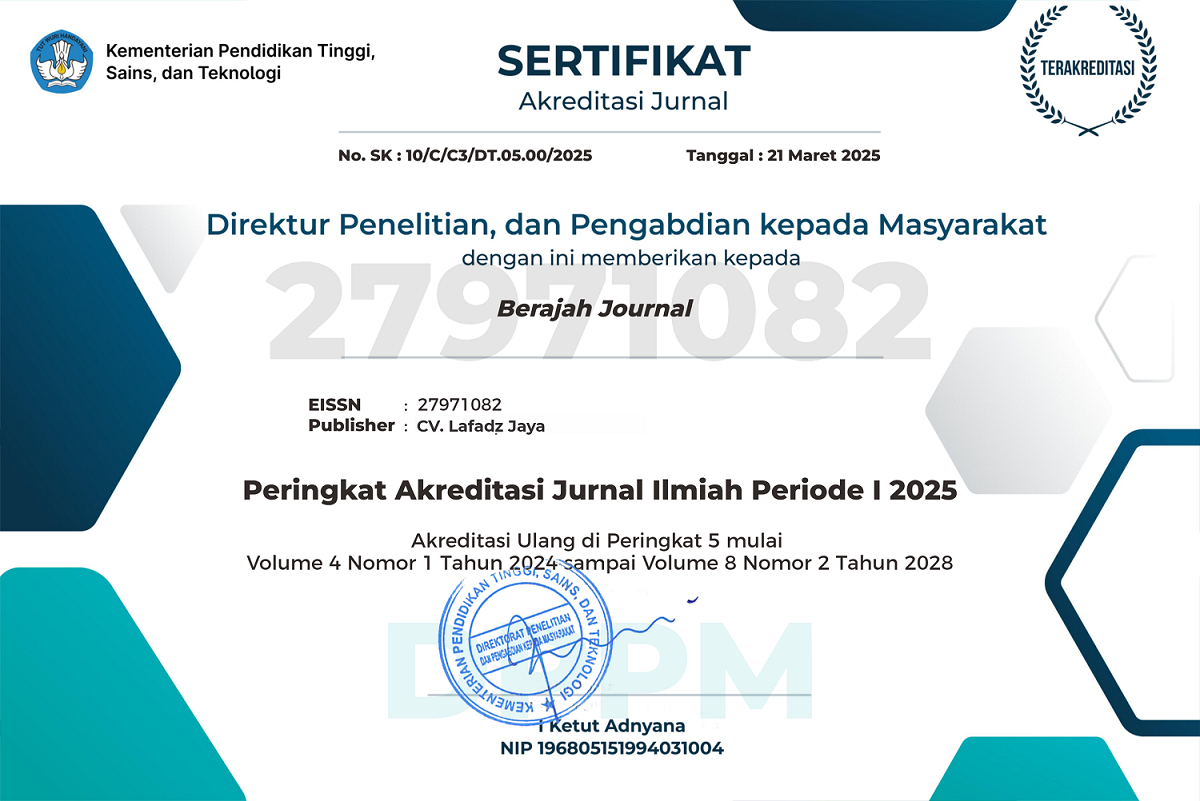MENGGALI DASAR MATEMATIKA: META-ANALISIS PENGENALAN KONSEP MATEMATIKA PADA ANAK USIA DINI UNTUK PEMBELAJARAN YANG LEBIH EFEKTIF
DOI:
https://doi.org/10.47353/bj.v4i7.440Keywords:
Mathematics Introduction, Early Childhood, Meta-Analysis, Interactive LearningAbstract
The introduction of mathematical concepts in early childhood has a significant impact on cognitive development and academic abilities. This article presents a meta-analysis of 15 studies exploring effective teaching methods for preschool mathematics. The analysis highlights the most effective approaches to introducing basic mathematical concepts, including play-based learning, visual aids, technology integration, and social interaction. Findings show that play-based learning and collaborative approaches significantly enhance children's engagement and understanding, with effect sizes of 0.75 and 0.74, respectively. Visual aids were also proven effective, with an effect size of 0.85, while educational technology, through interactive applications, achieved an effect size of 0.82. Emphasizing enjoyable and interactive learning can build a positive view of mathematics and improve children’s ability to apply concepts in real-world contexts. This analysis provides educators and parents with guidance for designing more effective learning experiences, supporting a strong mastery of mathematical concepts in early childhood.
Downloads
References
Aunio, P., & Räsänen, P. (2015). Core Numerical Skills for Mathematics Learning in Children Aged Five to Eight Years – A Working Model for Educators. European Early Childhood Education Research Journal, 23(5), 687-705.
Baroody, A. J., Lai, M. L., & Mix, K. S. (2006). The Development of Young Children's Early Number and Operation Sense and its Implications for Early Childhood Education. In Handbook of Research on the Education of Young Children (pp. 187-221). Mahwah, NJ: Lawrence Erlbaum.
Benavides, M., & Doss, D. (2020). Early Mathematics Learning and Technology Integration in the Classroom. Journal of Early Childhood Education, 48(2), 101-116.
Clements, D. H., & Sarama, J. (2009). Learning and Teaching Early Math: The Learning Trajectories Approach. Routledge.
Clements, D. H., Sarama, J., & DiBiase, A. M. (2014). Early Childhood Mathematics Education Research: Learning Trajectories for Young Children. Routledge.
Fisher, D., & Frey, N. (2010). Designing Schoolwide Approaches to Literacy: A Guide for Educators. Pearson.
Flevares, L. (2001). Cultural Influences on Mathematics Learning. Early Childhood Education Journal, 28(4), 237-243.
Forman, E., & Cazden, C. B. (1985). Exploring Vygotskian Perspectives in Education: The Cognitive Value of Peer Interaction. In Culture, Communication, and Cognition: Vygotskian Perspectives (pp. 323-347). Cambridge University Press.
Frid, S., & Hurst, C. (2015). Learning through Activity: Active Learning in Mathematics. International Journal of Mathematics Teaching and Learning.
Ginsburg, H. P., & Baroody, A. J. (2003). Test of Early Mathematics Ability: 3rd Edition. The Psychological Corporation.
Hohmann, M., & Weikart, D. P. (1995). Educating Young Children: Active Learning Practices for Preschool and Child Care Programs. HighScope Press.
Indonesia Ministry of Education and Culture. (2013). Peraturan Menteri Pendidikan dan Kebudayaan Republik Indonesia No. 137 Tahun 2013 tentang Standar Nasional Pendidikan Anak Usia Dini.
Johnson, M. (2018). Early Childhood Mathematics: Encouraging a Positive Attitude. International Journal of Early Years Education, 26(2), 101-115.
Koenig, J. A., et al. (2019). Effects of Interactive Technology on Young Children's Mathematics Skills. Computers in Human Behavior, 93, 126-133.
Lee, J. K., et al. (2017). Collaborative Learning in Mathematics: How to Support Young Learners. International Journal of Educational Research, 86, 129-138.
LeFevre, J. A., Fast, L., & Skwarchuk, S. (2010). Pathways to Mathematics: Longitudinal Predictors of Performance. Child Development, 81(6), 1753-1767.
Miller, K. (2013). The Role of Technology in Early Childhood Mathematics Education. Journal of Educational Technology, 14(1), 45-54.
OECD. (2017). Early Childhood Education and Care: Research and Recommendations. OECD Publishing.
Piaget, J. (1952). The Origins of Intelligence in Children. International University Press.
Sarama, J., & Clements, D. H. (2009). The Importance of Teaching Mathematics in Early Childhood Education. Educational Researcher, 38(2), 104-117.
Stevenson, H. W., & Lee, S. Y. (1996). The Achievement Gap in Mathematics: Culture and Context. Educational Researcher, 25(8), 13-20.
Strutchens, M. E., & Silver, E. A. (2000). The Teaching and Learning of Mathematics in the United States. American Educational Research Journal, 37(4), 911-920.
Thompson, I. (2008). Teaching and Learning Early Number. Maidenhead: Open University Press.
UNESCO. (2015). Education for All 2000-2015: Achievements and Challenges. UNESCO Publishing.
United Nations. (2018). Sustainable Development Goals (SDG) Indicator Framework for Early Childhood Development. UN Publishing.
Van Oers, B. (2010). The Role of Play in Early Mathematics Learning. Journal of Educational Psychology, 102(4), 883-895.
Vygotsky, L. S. (1978). Mind in Society: The Development of Higher Psychological Processes. Harvard University Press.
Walsh, G., & Gardner, J. (2006). Teachers' Readiness to Implement Play-Based Learning. Journal of Early Childhood Teacher Education, 27(3), 261-276.
Yang, D. C., & Li, M. T. (2021). Visual Learning in Early Childhood Mathematics: An Experimental Study. International Journal of Educational Research, 99, 101-115.
Zosh, J. M., et al. (2018). Learning through Play: A Review of the Evidence. American Journal of Play, 10(3), 223-241.
Downloads
Published
How to Cite
Issue
Section
License
Copyright (c) 2024 Usman Jayadi

This work is licensed under a Creative Commons Attribution 4.0 International License.






















